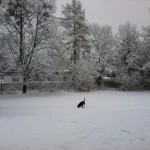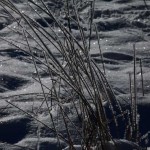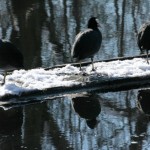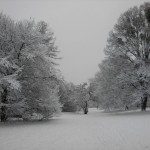The park is much quieter in the winter. There were hardly any people other than us. Two—a young woman and an older man, spotted at different times—were getting in their daily run, impressing us with their dedication. No one was out walking a dog.
Walking in the park in the winter, bundled up, scarfed, woolen-capped, and gloved, is nowhere near as comfortable, or as much fun, as walking in the park in the summer wearing shorts and a t-shirt.
Every sense is subdued—not in the sense of muted, but beaten down. The gray pall of sky leaves no color for the eye to see; the scattered birds make only a few forlorn chirps for ears to hear; withered flowers have no scents for smell; there is nothing to taste (until the thought of hot chocolate enters the mind); and the cold, hard world has no texture for unfeeling skin to touch.
- pay_attention to_detail-II
The week-old snow, still piled everywhere, blots color from the land, leaving a no-longer white sameness that, in the grim gray light, neither sparkles nor looks fresh. The snow has subsided as a result of a few warmer days but on this sub-freezing afternoon, it has turned dry and crusty, inviting no skiers, no gleeful snowman builders, no atavistic snowball fights. It is harsh and unwelcoming, like the air.
The grayness of the sky and the grayness of the land make for a certain austere beauty, if desolation is your thing.
Yes, the cycle of the seasons is necessary, and winter’s death-like sleep is needed as a rest from—and to make possible again—the endless energy of summer. But why does it have to last so long? (“So long” meaning more than, say, a week or two.)
The lifeless world induces a kind of peace in the mind. Or else all the gears are frozen in place.





